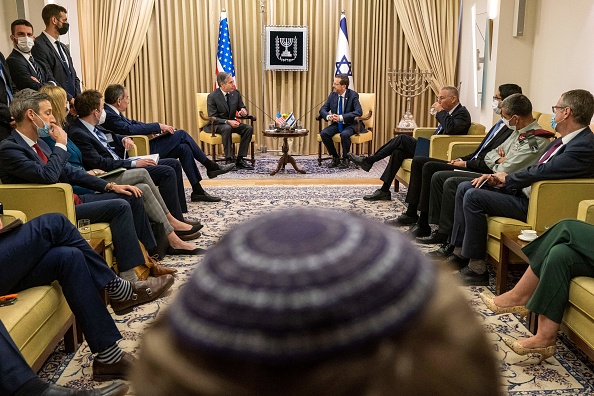Lapid’s flagship Negev Summit sets sail on a sea of regional fears-Report

Shafaq News / The Negev Summit hosted by Foreign Minister Yair Lapid on Sunday and Monday is being touted as a show of force against Iran.
The foreign ministers of the United Arab Emirates, Bahrain, Morocco, and Egypt are joining Lapid and US Secretary of State Antony Blinken, and there is no question that Iran will sit at the forefront of the agenda.
But the gathering in Sde Boker isn’t a show of confident unity. In fact, quite the opposite.
After witnessing a series of worrying developments, the diplomats are rushing to Israel to try to shift US policy before they are forced to fend for themselves.
“Desperate times call for desperate measures,” said Moshe Albo, a modern Middle East historian and researcher at the Institute for Policy and Strategy at Reichman University in Herzliya.
“The summit is primarily an indication of the countries’ sense of urgency in light of several processes coming together and turning into a multi-dimensional threat — to their internal stability, to their regional posture,” Albo said.
The primary threat is Iran and its proxies. The network, led by Iran’s Revolutionary Guard Corps, has become more aggressive and shown dangerous new capabilities in recent weeks.
Yemen’s Iran-backed Houthi rebels launched missile and drone attacks in January and February targeting the UAE, including a January 31 ballistic missile attack while President Isaac Herzog was in the country.
They have also continued to fire on Saud Arabia. A week ago, Houthi rebels targeted a range of water and energy plants. On Friday, they hit Saudi Arabia with a wave of drone and missile attacks, including against an oil plant near the Formula One race track in Jeddah, two days before the race.
Also this month, Iran fired 12 missiles toward the US consulate in Iraq’s northern city of Erbil, with several missiles hitting the building.
At the same time, nuclear talks in Vienna seem to be headed toward a successful conclusion, with the IRGC, tied to the attacks against the Gulf states, likely to be removed from US terror blacklist.
“The Gulf states are saying, ‘Just a minute here,'” said Albo. “We have a strategic pillar that is supposed to support us on regional stability, that is also leading the effort to renew the nuclear deal with Iran. This makes Iran more daring in the region, and therefore the scope of the Iranian threat is growing.”
“The Americans are determined to sign [the nuclear deal], and the countries here are very concerned,” explained Efraim Inbar, president of the Jerusalem Institute for Strategic Studies.
Blinken, on the other hand, is coming to “calm everyone down,” said Inbar.
Ideally, the Americans will be able to offer diplomatic and security guarantees that assuage the worst fears of their regional partners.
“This process is complex, and it won’t end in just a declaration against a state,” said Moran Zaga, an expert on the Gulf region at Mitvim — The Israeli Institute for Regional Foreign Policies.
But if the foreign ministers head home disappointed, the regional diplomatic flurry in recent weeks could turn into a storm as local actors understand they have to fend for themselves without the US.
It’s hard to know how any potential rebalancing would shake out. The UAE and Saudi Arabia will likely continue their quiet overtures toward Iran to try to guarantee some sort of stability.
But they could also show both Iran and the US that they know how to get along without them. A regional framework for maritime security is a possibility, and Prime Minister Naftali Bennett has pushed for a regional air defense network.
Or the US-allied Arab nations could move to shape the direction of the Middle East themselves.
“A surprise could come from Syria or Iraq,” said Zaga.
Recent high-level meetings in the region could support this idea.
On Friday, Jordan’s King Abdullah II hosted leaders from Egypt, Iraq, and the United Arab Emirates for talks. The week before, Syrian President Bashar Assad was hosted by Abu Dhabi Crown Prince Sheikh Mohammed bin Zayed Al-Nahyan, the UAE’s de facto ruler.
The Gulf states, Jordan, and Egypt could be positioning themselves to elbow Iran out of Syria and Iraq, promoting regional stability while disrupting Tehran’s ability to support proxies. It would also send a message to the US that their regional allies are taking matters into their own hands.
If Syria accepts increased Gulf involvement in its reconstruction, it may be willing to support them in Lebanon as well. Though the Assad regime was happy to accept Iranian support to stay in power, it has long been at odds with Iran over its vision for the region, especially in Lebanon and Iraq.
(The Times of Israel)